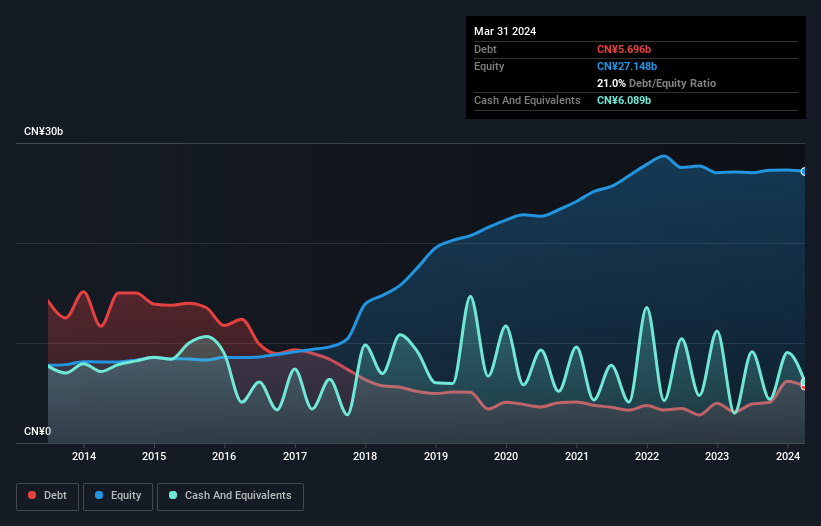
Warren Buffett famously said, 'Volatility is far from synonymous with risk.' It's only natural to consider a company's balance sheet when you examine how risky it is, since debt is often involved when a business collapses. Importantly, Xinyu Iron & Steel Co., Ltd (SHSE:600782) does carry debt. But the more important question is: how much risk is that debt creating?
When Is Debt Dangerous?
Debt is a tool to help businesses grow, but if a business is incapable of paying off its lenders, then it exists at their mercy. If things get really bad, the lenders can take control of the business. While that is not too common, we often do see indebted companies permanently diluting shareholders because lenders force them to raise capital at a distressed price. Of course, debt can be an important tool in businesses, particularly capital heavy businesses. The first step when considering a company's debt levels is to consider its cash and debt together.
View our latest analysis for Xinyu Iron & Steel
What Is Xinyu Iron & Steel's Debt?
You can click the graphic below for the historical numbers, but it shows that as of March 2024 Xinyu Iron & Steel had CN¥5.70b of debt, an increase on CN¥3.12b, over one year. However, its balance sheet shows it holds CN¥6.09b in cash, so it actually has CN¥392.5m net cash.

How Healthy Is Xinyu Iron & Steel's Balance Sheet?
According to the last reported balance sheet, Xinyu Iron & Steel had liabilities of CN¥20.1b due within 12 months, and liabilities of CN¥3.73b due beyond 12 months. Offsetting these obligations, it had cash of CN¥6.09b as well as receivables valued at CN¥7.22b due within 12 months. So its liabilities outweigh the sum of its cash and (near-term) receivables by CN¥10.5b.
This deficit is considerable relative to its market capitalization of CN¥12.0b, so it does suggest shareholders should keep an eye on Xinyu Iron & Steel's use of debt. This suggests shareholders would be heavily diluted if the company needed to shore up its balance sheet in a hurry. While it does have liabilities worth noting, Xinyu Iron & Steel also has more cash than debt, so we're pretty confident it can manage its debt safely. When analysing debt levels, the balance sheet is the obvious place to start. But it is future earnings, more than anything, that will determine Xinyu Iron & Steel's ability to maintain a healthy balance sheet going forward. So if you want to see what the professionals think, you might find this free report on analyst profit forecasts to be interesting.
Over 12 months, Xinyu Iron & Steel made a loss at the EBIT level, and saw its revenue drop to CN¥60b, which is a fall of 38%. To be frank that doesn't bode well.
So How Risky Is Xinyu Iron & Steel?
Although Xinyu Iron & Steel had an earnings before interest and tax (EBIT) loss over the last twelve months, it made a statutory profit of CN¥246m. So taking that on face value, and considering the cash, we don't think its very risky in the near term. With revenue growth uninspiring, we'd really need to see some positive EBIT before mustering much enthusiasm for this business. The balance sheet is clearly the area to focus on when you are analysing debt. However, not all investment risk resides within the balance sheet - far from it. For example Xinyu Iron & Steel has 2 warning signs (and 1 which doesn't sit too well with us) we think you should know about.
When all is said and done, sometimes its easier to focus on companies that don't even need debt. Readers can access a list of growth stocks with zero net debt 100% free, right now.
New: AI Stock Screener & Alerts
Our new AI Stock Screener scans the market every day to uncover opportunities.
• Dividend Powerhouses (3%+ Yield)
• Undervalued Small Caps with Insider Buying
• High growth Tech and AI Companies
Or build your own from over 50 metrics.
Have feedback on this article? Concerned about the content? Get in touch with us directly. Alternatively, email editorial-team (at) simplywallst.com.
This article by Simply Wall St is general in nature. We provide commentary based on historical data and analyst forecasts only using an unbiased methodology and our articles are not intended to be financial advice. It does not constitute a recommendation to buy or sell any stock, and does not take account of your objectives, or your financial situation. We aim to bring you long-term focused analysis driven by fundamental data. Note that our analysis may not factor in the latest price-sensitive company announcements or qualitative material. Simply Wall St has no position in any stocks mentioned.
About SHSE:600782
Adequate balance sheet and fair value.
Market Insights
Community Narratives




